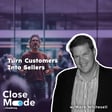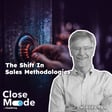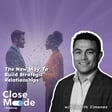
Mastering B2B Street Fighting with Insights from Austin Smith
In this episode, Brian Dietmeyer talks to Austin Smith, an enterprise account executive at Oomnitza, about the evolving landscape of B2B sales, aptly termed "B2B Street Fighting." They dive into how the sales environment has shifted over the past five years, discussing the increased challenges in building and closing pipelines, the necessity of adaptability in sales strategies, and the importance of creativity in outreach and customer engagement. This conversation offers valuable insights for sales professionals navigating the complex terrain of modern B2B sales.
Timestamps:
00:04 Introduction to the episode and guest Austin Smith.
01:07 Discussion on the topic of "B2B Street Fighting."
02:00 Austin shares insights on market changes in sales over the last five years.
03:00 Examination of pipeline strategies in current market conditions.
03:55 Austin discusses adjustments in sales approach due to market shifts.
07:40 Austin advocates for a less uniform approach to sales metrics and strategies.
09:03 Importance of team selling and leadership involvement in deals.
11:45 The balance between skills coaching and deal coaching in sales.
15:09 Creative strategies for lead generation and customer engagement discussed.
17:39 Final thoughts on improving internal processes for deal approvals.















